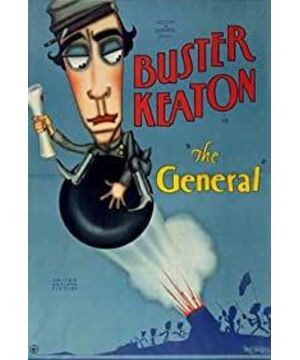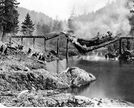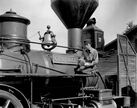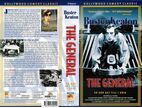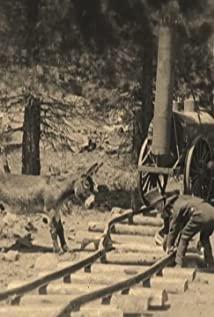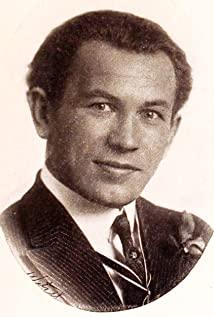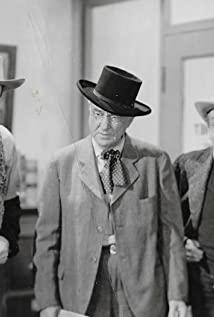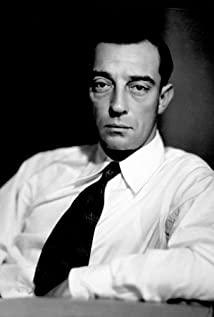For more than 90 years, it is still the "most dangerous" movie and the "most expensive" movie lens.
Speaking of the "silent films" in movies, the first thing we think of is Chaplin's movies: Chaplin's actions are exaggerated and funny in the black and white pictures. In the same period, there was also an outstanding filmmaker who had a position comparable to Chaplin in film history, and he was Buster Keaton.
He is a comedy genius in the golden age of Hollywood silent films, standing close to Charlie Chaplin and Harold Lloyd. The films he starred in "The Voyager" and "The General" have always been repertoires of American theaters. .
Today I will introduce Keaton’s most outstanding work "The General". Some people think that this film is one of the best comedy silent films in film history, and many universities in the United States will study this film when they talk about film. In 1977, the American Motion Picture Association included it in the "Fifty Best Films in Film History".
In fact, this movie is also one of the "most dangerous" movies. In the 1920s when the film industry was underdeveloped, there were no special effects and general protection facilities. Many dangerous shots were real shots. Buster Keaton wanted to shoot this movie. The film has been in danger many times, even with fate. He is even more desperate than those recognized in the movie circle like Jackie Chan and Tom Cruise. On the other hand, in order to make this movie well, Buster Keaton invested all of his own property, which is still a sky-high price today.
"The General": Train and Love in the Civil War
The story of "The General" is based on William A. Pittenger's book "Brave and Suffering: A Great Railway Adventure History" on the Civil War. This work was published in 1863 and the title was changed to "The Great Locomotive" after 1893. Chasing War.
Keaton was very interested in this history, and he decided to take this story out. Therefore, he took over all the work of writing the plot, writing the sub-scene script, directing, editing, writing subtitles and starring. He is definitely a well-deserved all-rounder.
In order to shoot the scene he wanted, Keaton led the film crew to Oregon to find the narrow-gauge railway used in the past. He also restored the old train written in the original one-to-one, and chose an exterior scene that resembled the scenery of Tennessee. At the venue, seventeen wagons were transported from Los Angeles, five hundred people were hired to play the Southern and Northern forces, and the Oregon National Guard and more than one hundred horses were used.
The story of the film begins with the outbreak of the Civil War. The town where the protagonist train driver Johnny lives is caught in the flames of war. Johnny only loved two things in his life, one was his girlfriend and the other was the train. But just as he proposed to his girlfriend, he received a notice of enlistment.
His girlfriend wanted him to be a soldier, but the officers thought he was more suitable to be a train driver. Johnny explained to his girlfriend why he could not put on the military uniform, but the girlfriend thought he was lying, called him a coward and broke the engagement with him. It was not until a year later that Johnny’s "General" and his girlfriend were taken away by the northern army because of a northern army raid.
This is followed by a narrative that is very symmetrical: Johnny drives a train to chase the "General", and later he regains the "General" and escapes with his girlfriend, forming a perfect symmetry.
The real train crashing into the river, a shot cost 4.2 million US dollars
The climax of the movie "General" is that the villain Johnny induces the train chasing Johnny to a wooden bridge. Before it is about to catch up with Johnny's "General", he sets fire to the bridge. An arrogant Northern Army officer ordered the train to pass over the flaming bridge, and finally the bridge collapsed and the car fell.
This is a real train falling into the river, the scorching steam splashing all over, the officer's expression is stunned-this is one of the best shots in the film. This lens alone cost 42,000 US dollars (equivalent to the current 4.2 million US dollars), which was the most expensive lens at the time.
It is said that the train whistle sounded a mournful trombone at that time, echoing this disastrous spectacle. A dummy was placed in the front control room to create the illusion of the locomotive's death. When the damaged dummy head drifted down with steam, more than one woman among the onlookers fainted on the spot.
In the movie, the EFF’s frightened expression is also a fake, because the crew did not inform the actors of the upcoming train catastrophe. For the next fifteen years, this train lay quietly on the river bed. It wasn't until World War II that it was salvaged and sold as scrap iron.
And because of the high production costs of the film, the film has a net loss of more than 400,000 US dollars. Although it does not seem to be a large number now, you must know that this is more than 400,000 U.S. dollars in the 1920s, which is roughly equivalent to the current 40 million U.S. dollars, which is more than 200 million yuan in RMB!
It can be said that Keaton directly lost the fortune of a billionaire. Even if Keaton was very maverick, he was devastated by this huge blow.
Buster Keaton: The most desperate sneer
Buster Keaton, he has a louder name-Sneer. They are exactly the same as the nicknames of Hong Kong's first-generation comedy king Xu Guanwen, they are all comedy masters who have a profound influence on the history of film.
Keaton's performance is very style: his performance is characterized by light posture, agility and dexterity, elegant and precise movements, no matter how stumbling, his face will always remain flat and sly wisdom. And he is good at acting out serious subjects with humor. He believes that life is severe and humor itself is also serious. He doesn't like nonsense.
His performance style still affects generations of comedy performers. Including Stephen Chow, Jackie Chan, these actors we are familiar with, they can all be regarded as Keaton's successors.
Especially Jackie Chan, he doesn't need a stand-in, and his performance style of jumping up and down is very similar to Keaton. Some netizens joked: Buster Keaton is Jackie Chan's ancestor. Moreover, Keaton's "Leap of Faith" was 72 years earlier than Jackie Chan.
For example, during the filming of the movie "Three Ages", Keaton made a mistake when he jumped from the top of the building. The photographer recorded all this in accordance with Keaton's "camera can't stop" requirement. People who have worked with Keaton describe Keaton as "It is a miracle that he survives every time he finishes filming a movie."
Moreover, he pursues a one-shot shooting method and refuses to edit too much. Because Keaton believes that if a shot cannot be completed in a natural state, then the comic effect of the shot will not be fully demonstrated. So when we watch Keaton's movies, we often unconsciously sigh for him, because it is too real and too dangerous.
Take a fragment from the General. Keaton stood on the rails busy clearing obstacles, and behind him, the train was moving forward at its normal speed. This is a train rushing people. If you don't pay attention, Keaton may be caught under the train wheels.
Perhaps because of this desperate spirit, Keaton's comedy has completely transcended an era. To this day, many movie fans are still shocked by it. In contrast, think about some of our little fresh meat actors now, even if they have a finger cut and a small mouth, they have to post on Weibo for comfort. It is not difficult to understand why they become popular and pass away quickly. And Keaton, until decades later, there are still countless fans cheering for him.
Leading the era, late bloomer comedy master
Although the filming was very diligent, expended a lot of manpower and material resources, and even endangered life, after the release of "General", critics generally expressed dissatisfaction. Eight of the ten major newspapers and magazines held a completely negative attitude. Only a few critics thought it was. It is a work of genius. Some people think that the film's failure in the box office and public opinion may be because its content is so rich that the audience in 1927 could not understand it.
Until 29 years later, people found a forgotten copy in the director's old house. The film was re-screened, and it spread all over Europe. After another 5 years, the director was awarded the Oscar for Lifetime Achievement. And one day in 2000, AFI (American Film Institute) selected the 100 greatest films in film history, and this film ranked 18th.
At the Venice Film Festival in 1965, Keaton, who was in his seventies, was invited to participate and became the most shining star in the audience. Outside the door, a crowd of movie fans blocked asking for his autograph, and photographers stayed at the pier all day and night to wait for his boat to arrive. In the movie screening hall on Lido Island, a group of critics from various countries was the most difficult to serve in the world. The audience sits with pens in jeopardy, waiting for his arrival.
Keaton, the universally recognized master of comedy, had tears in his eyes when he was interviewed. He loves the film industry for which he has worked hard all his life. He said: "This is the first time I have been invited to a film festival in my life. I hope this will not be the last time."
However, in early November 1965, after Keaton finished filming "Reporter" in Toronto, the doctor diagnosed him with lung cancer and could live another three months. Thus, on February 1, 1966, a generation of comedy masters died suddenly.
God jealous of talent! When Buster Keaton was young, he worked diligently and desperately to make movies and devoted everything to his beloved film career, but no one understood him at that time. In his later years, he finally gained the attention of the world and was crowned by the times. Unfortunately, time is not waiting.
Fortunately, Buster Keaton's pure love for movies and his brave spirit of dedication have been passed down, and generations of fierce filmmakers have worked hard for their dreams. Today, when we watch these silent films again, we should deeply remember the hardships behind the films.
View more about The General reviews


